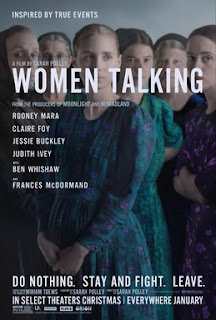
Written by: Sarah Polley
Starring: Rooney Mara, Claire Foy, Jessie Buckley, Judith Ivey, Ben Whishaw, Frances McDormand
Rating: [4.5/5]
When engrossed in a community that defines one’s known existence, contemplating the mere idea of exiting even for traumatic reasons will cause a challenge. It creates the feeling of being trapped by your captors with the dreadful uncertainty of the other side. You know the monster you are running away from but have no idea what monster you could be running towards. These complexities get captured in a heartbreaking and effective manner in Women Talking that allows us simply to listen and are much better because of it.
Within a Mennonite community, women and girls have routinely been violently raped in the middle of the night after being drugged. After they discover the culprits are men within the community they are given the choice to either forgive them or be banished from the community. The women must now decide not only their future but that of their children as well.
While having a straightforward title, Women Talking contains multitudes in what it represents seeing as it shows a dialogue between women with different perspectives but, more importantly, it rarely features men. The only one of note is the schoolteacher, who serves as the notetaker of the meeting and mostly does not say a word unless asked to speak. The talking represents more than just these women seated at a barn debating about their options moving forward but merely the fact they are allowed to voice their opinions amongst their peers most likely for the first time in their lives. They continually live this suffocating lifestyle but now they have a voice and they can elect whether they will keep the status quo, stay and fight, or leave.
Throughout the narrative, each individual audience member may be able to distinguish what they would do in the circumstance but this discussion revolves around a select group of women deciding what every woman in the community will do moving forward. It becomes about what is best for every single woman and the wide breadth of opinions in the feature gives perspective to every side of the discussion. Each character has a compelling case and shows the breadth of emotions that come with being assaulted and how one would respond. Salome (Claire Foy) wants to stay and fight to make these men pay for violating young girls and women alike. Mariche (Jessie Buckley) wants to stay because there is no other choice out there. Seeing as these women were deprived of the chance to learn how to read or even conceptually understand there is a world outside of their community, the issues that would come with the relocation can be frightening.
Each case makes sense, which shows the difficulty of reaching a conclusive decision for all and how one’s own perspective might not represent what is best for the majority. This all gets interwoven so seamlessly through its screenplay. Sarah Polley, who also directed the feature pieces everything together so astutely and sets these wonderful actors up to deliver these heartbreaking lines of dialogue with such vigor and force. Another compliment for the screenplay comes from the sprinkles of humor that land incredibly well. You might be perturbed that a film with this subject matter would have several moments of humor but it shows how laughter can help express feelings when words cannot. Laughter can serve as a release when nothing else will do the trick. Several moments provided a good chuckle but it comes from these women trying to find something to hang onto in this horrible situation, which feels true to life.
Personal and collective trauma certainly play a large role in what occurs in this feature but the larger discussion about the systemic issues that allowed these horrific attacks to happen allows for a look to the future. As mentioned before, the decision these women will make not only impact them but also their children and who they would take with them. These men were once boys and raised in the same traditions as the young boys of the community. Can they be reconciled or is it too late to stop them from committing the same brutal attacks on the next generation of women? At one point it becomes a numbers game but it poses yet another heartbreaking challenge for these women in trying to discern what is best for the whole when so many different perspectives exist.
Not all ensemble casts are created equal where they can simply just be a bunch of names thrown together with some having throwaway roles. The women put together for this feature define a true ensemble in the way they each provide nuance to the discussion and bring a perspective to the table that brings meaning. Each one of them gets a moment to shine whether it be the anger of Mariche, the light touch of Greta (Sheila McCarthy), and the warm love of Agata (Judith Ivey) They all play so well off each other and truly bring the humanity of this feature to the forefront.
Women Talking contains a heartbreaking story but it’s undoubtedly a human one. The setting is small in scope but the discussion involves touches on larger systemic issues that make this story unfortunately modern. These conversations sway, get off-topic, and get heated, but most importantly it creates an opportunity for these women to raise their voice for the first time in their lives. They get to make the decision and the journey taken on with them is incredibly enriching.


One Reply to “Review: Women Talking”